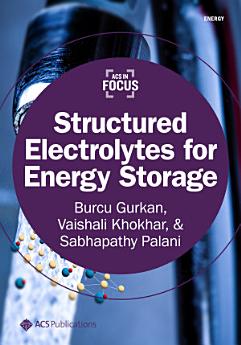Structured Electrolytes for Energy Storage
About this ebook
The authors encourage the reader to consider the following questions as they explore the world of structured electrolytes:
What are the key challenges hindering the progress of energy storage technologies in your area of research?
Can structured electrolytes offer solutions to overcome these challenges?
How can these electrolytes be tailored to meet the specific requirements of different energy storage applications?
By assessing these questions, the reader will be well-equipped to identify opportunities where structured electrolytes can significantly advance energy storage research and development.
Ratings and reviews
About the author
Burcu (Eksioglu) Gurkan is the Kent Hale Smith Professor for the Case School of Engineering II at Case Western Reserve University; she is the Associate Editor for ACS Applied Engineering Materials; serves as the Director of BEES2 (Breakthrough Electrolytes for Energy Storage Systems)−a Department of Energy Frontier Research Center (EFRC) where she leads the effort in developing structured electrolytes for flow batteries and a Key Researcher in 4C (Center for Closing the Carbon Cycle) EFRC where her team develops functional electrolytes for capture and conversion of CO2. Her team synthesizes and investigates deep eutectic solvents and ionic liquids for solving problems in separations, electrocatalysis, energy storage and conversion.
Vaishali Khokhar is a postdoctoral researcher at Case Western Reserve University, where she develops novel structured solvents for metal separation and contributes to the fundamental understanding of solvation effects in redox flow batteries. She earned her Ph.D. in Chemistry from the Indian Institute of Technology Delhi in 2023. Her dissertation research focused on the fundamentals of deep eutectic solvents and their role in molecular aggregation. She completed her M.Sc. in Chemistry at the University of Delhi in 2017 and her B.Sc. (H) in Chemistry from Miranda House, University of Delhi, in 2015.
Sabhapathy Palani earned a Ph.D. in 2019 from National Tsing Hua University (NTHU) as a TIGP fellow (Taiwan International Graduate Program, jointly with Academia Sinica and NTHU). His doctoral thesis focused on creating a non-precious metal single-atom catalyst for hydrogen evolution reactions and investigating how the coordination environment affects catalytic activity. After earning his Ph.D., he joined National Taiwan University as a postdoctoral researcher before moving to CWRU in 2023. Sabhapathy’s expertise in electrochemistry includes catalyst development and the understanding of the reaction mechanisms for water splitting, oxygen reduction, and carbon dioxide reduction reactions. Currently, he is developing structured electrolytes for energy conversion and storage.








